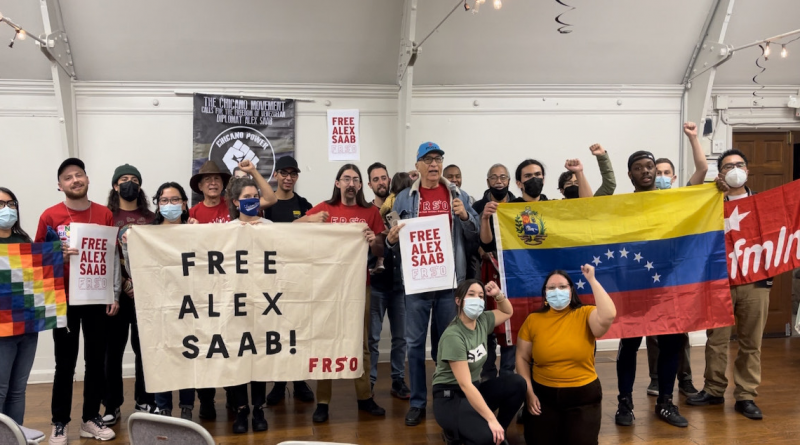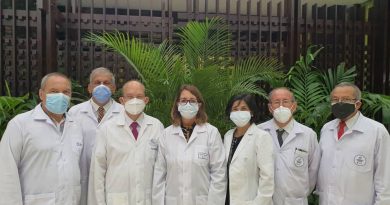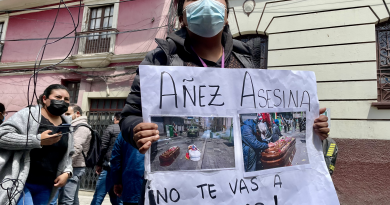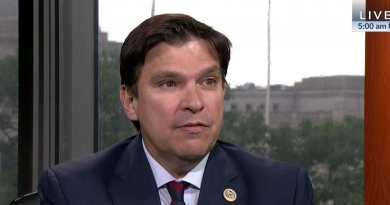Chicano Solidarity with Venezuela and the Campaign to Free Alex Saab
By Abraham Márquez
On November 20, the Freedom Road Socialist Organization (FRSO), a Marxist-Leninist anti-imperialist party in the United States, hosted the “Chicano Solidarity with Venezuela to free Alex Saab” event with Dozthor Zurlent. He is a former advisor to the late-Venezuelan President Hugo Chávez and author of ‘Globalization of the Capitalist Crisis, Understanding Development’ and ‘Supra-State vs. Communal State.’ He was on a speaking tour in the U.S. to bring awareness to the ongoing illegal sanctions against the people of Venezuela and the kidnapping of diplomat Alex Saab.
Earlier in the month, Zurlent spoke in Minneapolis, where he visited George Floyd Square, at the site at which the Minneapolis police murdered Floyd on May 25, 2020, and a large-scale community struggle then fought to erect a memorial to his life. “It does not matter the distance, it does not matter the borders, we are the same people,” said Zurlent. “Floyd, the same as many others, (was) murdered by this criminal system that oppresses people not only here in the U.S. but all over the world,” he added when addressing Minnesotans.
FRSO held the event in Lincoln Heights, one of the oldest working-class neighborhoods in Los Angeles, at the Nationally Registered historic Church of Epiphany. The church is a former hub for organizing the 1968 East L.A. Chicano student walkouts and the 1970 Chicano Moratorium anti-Vietnam War protest. In addition, it was a planning base for the Brown Berets, the Blowouts, Cesar Chavez, and the United Farm Workers during the 1960s and 1970s. The church’s basement was home to “La Raza,” a bilingual newspaper and magazine published by Chicano activists from 1967 – 1977. The church welcomed the invitation to host Dozthor Zurlent with open arms, a gesture of solidarity with the people of Venezuela.
Angelenos attended the meeting to hear a rare first-hand report from Zurlent, about the achievements and obstacles faced by the revolutionary Bolivarian process and the imprisonment of diplomat Alex Saab, contrary to the hostile “reports” we get from the corporate media in the U.S.
The Bolivarian Process of Participatory Democracy vs. The U.S. Empire
For the last hundred years, the Venezuelan economy has depended on oil to fund its national budget. During most of that time, the oil industry was owned by a handful of foreign robber barons and their local agents, namely Shell and ExxonMobil. Since Hugo Chávez’s triumphant election victory in 1998, the Bolivarian Revolution has made enormous social progress with the help of a nationalized oil industry to fund public programs. However, it the Revolution is still fighting to overcome the legacy of foreign domination, an arduous undertaking that only a few nations have accomplished.
The United States has been hostile toward Venezuela, a country that has been fighting for an alternative path to capitalism—the building of Bolivarian socialism —since 1999. Under fierce antagonism, Venezuela still has to export petroleum products and other goods and technology to keep the economy going. Even the country’s state-owned and nationalized companies must operate by the rules of foreign corporations, creditors, and bankers. As a result, it gives the drivers of capitalism a set of tools to undermine, sabotage, and stop Venezuela’s economic development. “U.S. sanctions hurt everyday people,” said Zurlent in an interview with Kawsachun News. “Sanctions make it hard to access medicine and food to survive.” The private sector is still a dominant force that controls eighty percent of personal hygiene, seventy percent of pharmaceutical items, and fifty percent of food distribution. President Maduro has vowed to change this.
In 2016, President Nicolás Maduro created the social program “Local Supply and Production Committees (CLAP)” to serve more than ten million families. The CLAP program was launched to prevent people from going hungry with rising food costs. CLAP delivers food for households regularly every two weeks and has gained widespread support. As a result, over six million families benefit from the food distribution program. In addition to the food program, the government provides free healthcare to the people of Venezuela and those who can travel to the country for medical procedures. For example, Mike Huber and Arletty Ivisa Huber from Indiana, USA, traveled to Venezuela for cataract eye surgery to take advantage of ‘The Milagro Mission’ offered by the government. Mike needed surgery to prevent blindness in both eyes. The operation and medication for the following three weeks were free of charge; the cost for the procedure in the U.S. was $13,000, not including the medicine. The couple’s total expense for the trip was $3,200, saving ten thousand.
Furthermore, it has achieved a significant milestone of delivering four million new homes to low-income families at a low cost or free of charge, depending on their income. “We do not have to pay taxes for our houses, and no one can be evicted from their home. It belongs to the people,” said Zurlent.
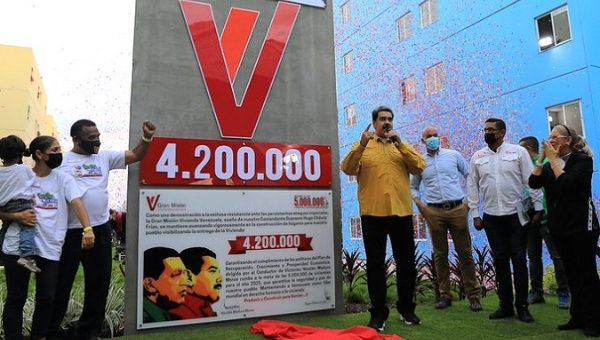
For any social program to be successful, the Partido Socialista Unido de Venezuela (PSUV), or United Socialist Party of Venezuela, and its leadership had to work around illegal U.S. sanctions. The sanctions have killed at least 40,000 people from 2017-2018, according to the Center for Economic Policy Research (CEPR). In addition, the report states that “these sanctions would fit the definition of collective punishment of the civilian population as described in both the Geneva and Hague international conventions, to which the U.S. is a signatory. They are also illegal under international law and treaties that the U.S. has signed and would appear to violate U.S. law as well.”
Alex Saab took part in this mission to bring food and medicine to Venezuela and successfully acquired agreements with the Colombian, Turkish, and Mexican governments. On April 9, 2018, Alex Saab was appointed Special Envoy of the Bolivarian Republic of Venezuela, making him a diplomatic official to perform humanitarian work. As a result, Saab achieved important bilateral agreements that brought Venezuela much-needed goods.
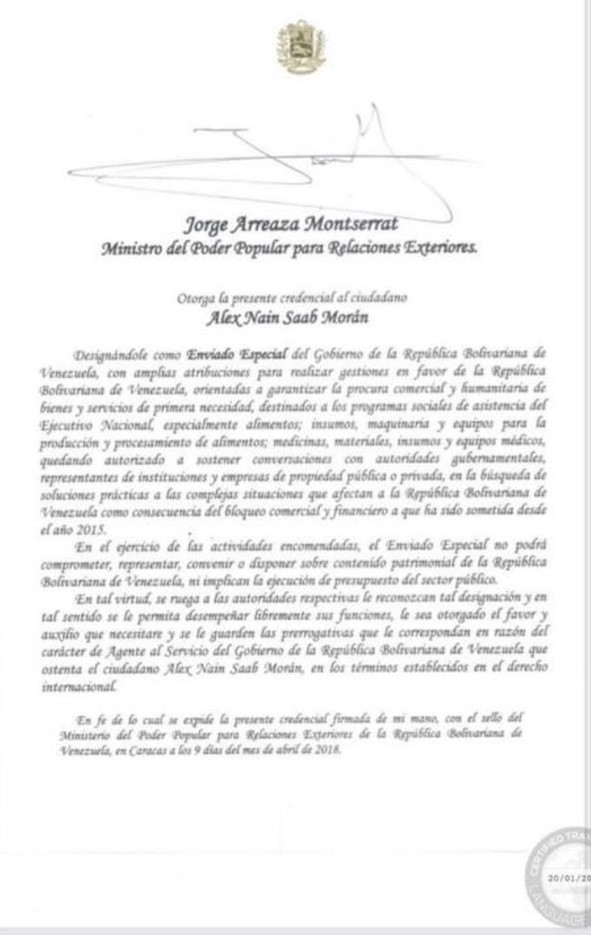
Alex Saab’s success did not go unnoticed by officials in Washington, DC. On July 25, 2019, Saab and his children were incorporated into a list issued by the Office of Foreign Assets Control (OFAC) of the United States Treasury Department. Later, a money laundering indictment was filed against him.
In 2020, as the COVID-19 pandemic was hurting economies in the global south, President Nicolás Maduro assigned diplomat Alex Saab with various humanitarian missions in March, April, and June of that year. The task aimed to bring food and medicines and arrange shipments carrying millions of barrels of fuel from the Islamic Republic of Iran, as well as spare parts for the refineries that had paralyzed petrol production due to the illegal blockade.
This humanitarian mission on June 12, 2020, was interrupted when his plane landed in the Republic of Cape Verde to refuel. As a result, Saab was forcibly removed from the plane by Cabo Verdean police, who did not have an arrest warrant. The next day, the U.S. had INTERPOL issue a ‘Red Notice,’ which was later canceled by INTERPOL. When the arrest warrant arrived after the fact, the warrant was made out to someone who was not Alex Saab.
Saab’s detention violates international law. Under the Geneva Conventions, a credentialed diplomat such as Saab has absolute immunity from arrest, even in times of war. Nevertheless, the U.S. does not recognize Saab’s diplomatic status, “as if the U.S. has the authority to qualify whom other countries may choose and receive as their ambassadors,” said Camilla Fabri, Alex Saab’s wife, in a phone interview with Kawsachun News.
Furthermore, his abduction violated the minimal standards of due process because there was no INTERPOL Red Notice at the time of his arrest.
Once Alex Saab was put behind bars, the Venezuela Diplomat was isolated in a small cell without proper light or ventilation and tortured physically and psychologically, according to a statement released through his lawyers.
Using Food and Medicine as a Weapon
Washington’s attack on Venezuela’s food distribution program for the poor is part of a long history of the U.S. using food and medicine for domination. For example, in 1867, at Fort McPherson, Nebraska, Colonel Richard I. Dodge said, “Kill every buffalo you can. Every buffalo dead is an Indian gone.” This was the strategy Dodge created to conquer Plains Indians to make way for the Union Pacific and Kansas railroads. Dodge was not alone in that philosophy and practice. Lieutenant General John M. Schofield, from 1869 – 1870, said in his autobiography, “with my cavalry and combined artillery encamped in front, I wanted no other occupation in life than to ward off the savage and kill off his food until there should no longer be an Indian Frontier in our beautiful country.”
In 1874, under the eighth President of the United States, Ulysses S. Grant, the U.S. Army launched a campaign to kill buffalo to control the Native Americans and their land. As a result, at the turn of the twentieth century, the Native American population declined to 4-4.5 million. By 1901, it dropped to 237,000 people.
Going into the twenty-first century, this attack on people’s food did not stop. J. Edgar Hoover, former director of the Federal Bureau of Investigation (FBI), described the Black Panther Party for Self-Defense as “the greatest threat to the internal security of the country” in a 1969 memo. One of the Bureau’s main targets was the Party’s free “Breakfast for Children” program. The FBI also targeted churches that permitted the Black Panther Party to use their space to facilitate their free breakfast program. For example, father Frank Curran, a Catholic Priest in San Diego, California, was removed from his church and sent to “somewhere in the State of New Mexico for permanent assignment.” This came after the San Deigo Diocese received an anonymous letter about Father Frank’s relationship with the Black Panther Party. Since then, the breakfast program has not re-opened.
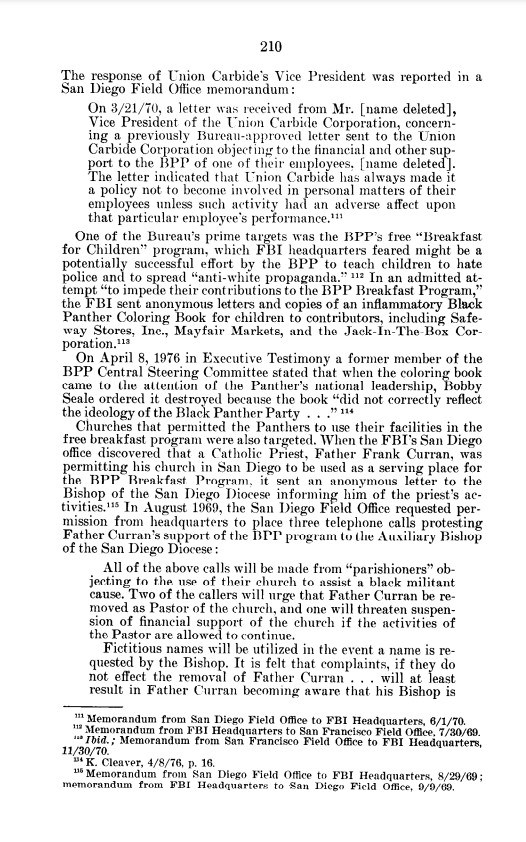
On August 6, 1990, the United Nations Security Council adopted resolution 661, sanctions that included a total trade and financial embargo on Iraq. As a result, they were not allowed to export their oil, their primary income, to the world market for the years to come. By 2003, approximately 1.5 million Iraqis, mainly children, died directly from the sanctions. The former U.S. Secretary of State, Madeleine Albright, publicly admitted that she believed the death of a million Iraqi children was “worth it.”
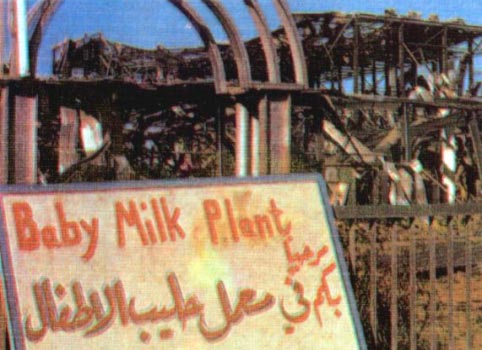
On January 21, 1991, on the seventh day of Operation Desert Storm, a coalition led by the U.S. bombed the Infant Formula Production Plant in the Abu Ghraib suburb of Baghdad, Iraq, claiming it was a “facility for biological weapons.” CNN’s Peter Arnett, a Pulitzer Prize winner for International Reporting, said, “whatever else it did, it produce infant formula,” after touring the damaged factory. Less than a month later, on February 13, the U.S. purposefully bombed an air raid shelter near the Bagdad airport, killing 408 Iraqi civilians.
On August 20, 1998, the Clinton administration bombed the Al Shifa pharmaceutical factory in Khartoum, Sudan, with 13 cruise missiles. The attack killed one and wounded eleven. The factory produced “90 percent of Sudan’s major pharmaceutical products.” Sudan requested the United Nations to investigate the bombing, stating that “tens of thousands of people – many of them children – have suffered and died from malaria, tuberculosis, and other treatable diseases.”
On October 16 and 26, 2001, in the early stages of the U.S.-led invasion of Afghanistan, they bombed the International Committee of the Red Cross housing complex in Kabul. To prevent this from happening again, the Red Cross informed the U.S. about all of its facilities in the country, yet the U.S. bombed the same building again. This time was destroying warehouses filled with supplies and food for refugees. “Now we’ve got 55,000 people without that food or blankets, with nothing at all,” said a Red Cross spokesperson.
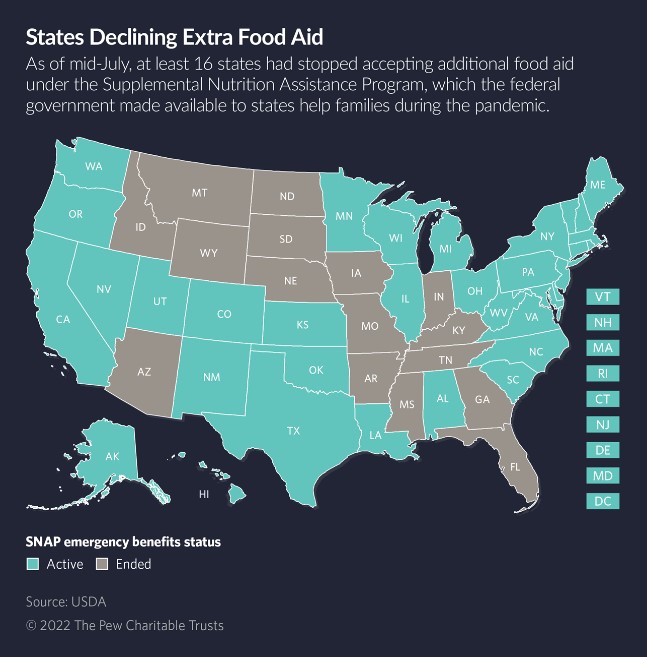
The Pew Charitable Trust, a global nongovernmental organization to improve public policy, published a report on July 19 stating that “more than 18 million Americans sometimes didn’t have enough to eat last month.” Adding that more than five million people often went hungry. More and more states are declining extra food aid from the federal government; a total of sixteen, as of mid-July, have stopped accepting the Supplemental Nutrition Assistance Program (SNAP). In fourteen states, lawmakers are introducing bills requiring people to work who receive SNAP. Right-wing think tanks have supported this bill. In addition, an overwhelming 2.5 million children in the U.S. are homeless; that is one in every thirty children in the county, according to The American Institutes for Research (AIR), a nonpartisan, not-for-profit organization that conducts behavioral and social science research.
Meanwhile, the U.S. military budget for 2023 is $773 billion.
The Legal Case for Alex Saab
On June 8, 2021, the government of Cape Verde was asked by the United Nations (UN) Human Rights Committee to suspend the extradition of Alex Saab. The UNHR Committee resolution includes steps to secure Saab’s human rights, including accessing his independent medical care. “We are not certain of Alex’s health status because since he was kidnapped 901 days ago (at the time of this interview), he has not even been able to see his family doctor,” said Camilla Fabri. “Being a cancer survivor, this situation worries us.” The diplomat has been denied visits by his physicians.
On November 14, the diplomat’s defense introduced a new motion before the court in Miami. First, they presented new evidence that supports his diplomatic immunity. Then, with some key points, Laila Tajeldine, Saab’s lawyer, released the information on her Twitter account. One of the points the defense makes is that “Saab’s diplomatic passport is valid.” Laila also pointed out that the U.S. does not need to recognize the Venezuelan President to respect the immunity of its diplomats. Nonetheless, the defense showed that “the U.S., in practice, recognizes the government of President Nicolás Maduro.” Lastly, it is noted that there are correspondences exchanged between the Office of the United States and the Venezuelan Ministry for Foreign Affairs.
To this day, the U.S. has not presented any evidence of Saab’s “corruption.” Moreover, Washington’s statement that Saab’s diplomatic documents were “fabricated” was contradicted by the “official government record of his appointment in 2018, contemporaneous State-to-State exchanges, the declarations of multiple witnesses,” as stated in their new motion. “The elements presented as reasons to request the extradition to the U.S. from Cape Verde were charges that had no legal basis, generic accusations about the Venezuela State,” said Camilla Fabri. “On the contrary, an investigation initiated in Switzerland found that the case was dismissed, closed, due to lack of evidence, the same case in Mexico,” she added.
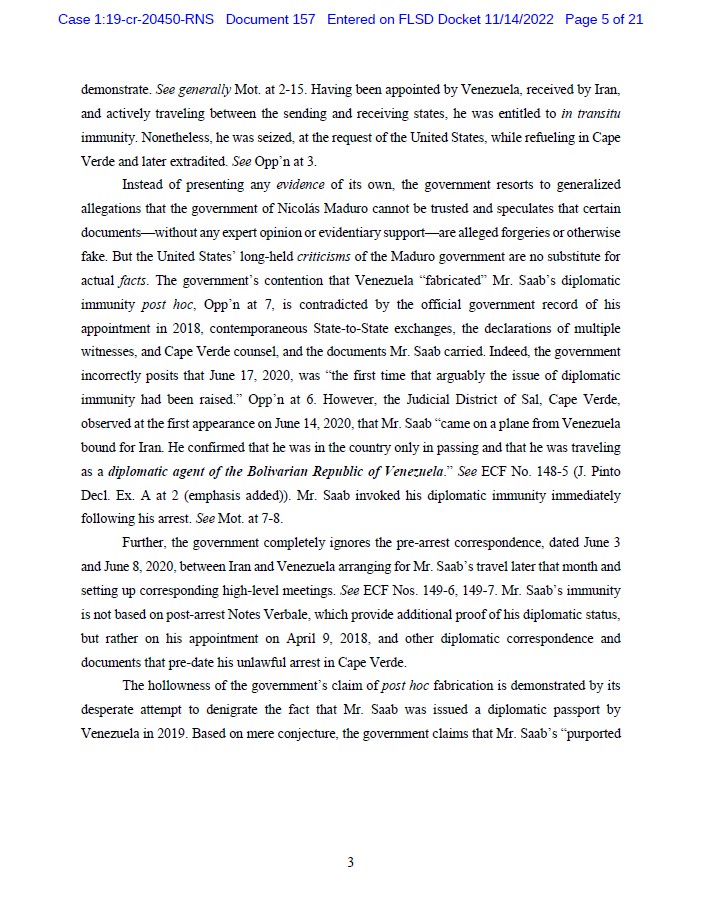
The U.S. government refuses to address the diplomatic immunity of the Venezuelan Special Envoy and has been delaying the trial. “It is important that people here in the U.S. support the campaign to free Alex Saab,” said Carlos Montes, founder of the Brown Berets and an organizer with the FRSO. “It is the U.S. government that speaks in our name that is violating the law and denying the democratically elected government of Venezuela from economic development,” Carlos added.
Alex Saab’s lawyers are in the process of providing additional evidence of his diplomatic immunity. “The prosecution says that Alex Saab’s passport is invalid because they do not endorse how the Venezuelan Immigration Service renewed the passport during the pandemic,” said Camilla. “As if that were their decision.”
The FRSO, Dozthor Zurlent, and Camilla Fabri are asking people to follow the campaign to free Alex Saab by visiting their website, Twitter page, Facebook, and Instagram for updates. Their next court hearing will be on December 12 to analyze his documentation to determine his immunity.
By Abraham Márquez for Kawsachun News
For more news and analysis, check out our podcast Latin America Review: https://linktr.ee/latinamericareview
